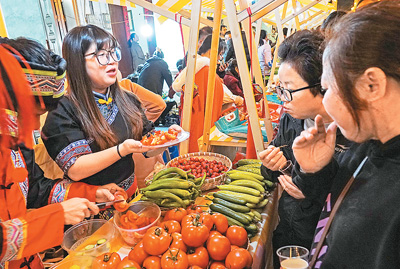China's nighttime economy leads to more round-the-clock stores
In many Chinese cities, a lot of stores have started staying open 24 hours a day.
Yu Bo, a resident in Haidian district, Beijing, noticed this trend firsthand. "A milk tea shop near my home used to close at night. Recently, I discovered that it has been open 24/7," said Yu, who lives in an apartment near the headquarters of an internet giant. "More than one store has run on a 24/7 mode since I moved here," Yu added.

Tourists buy fresh fruits and vegetables at a night market in Chang'an town, Rong'an county, Liuzhou city, south China's Guangxi Zhuang Autonomous Region, Nov. 28, 2024. (Photo/Yu Xiangquan)
According to a report issued by Alibaba Group, more than 83 percent of catering businesses on the group's online food delivery service platform Eleme remain open between 11 p.m. and midnight, and over 60 percent of these businesses continue operating past midnight.
In addition, some brick-and-mortar stores of Chinese popular tea beverage brands like Heytea, Chagee, and Mixue have started to stay open through the night.
The trend is spurred by China's thriving nighttime economy. Estimates suggest that the country's nighttime economy has exceeded 50 trillion yuan (about $6.88 trillion).
Data from service-focused e-commerce giant Meituan shows a significant surge in searches for round-the-clock catering businesses since the beginning of this year. This trend is also evident in bookstores and convenience stores, indicating the growing demand for nighttime consumption.

People view intangible cultural heritage products on a pedestrian street in Shijiazhuang, north China's Hebei Province. (Photo/Yan Zhiguo)
Businesses' extended operation hours not only boost business vitality but also enrich people's consumption choices and create new employment opportunities, said Zhang Xiaoxi, a researcher with the Institute of Economics of the Chinese Academy of Social Sciences.
Nighttime consumption also benefits related industry chains, including smart lighting, security monitoring and online payment, bringing more opportunities for the development of upstream and downstream industries.
According to a report from Eleme, 90 percent of 24/7 milk tea shops are in southern cities with booming nighttime economies. The report also indicates that 65 percent of night food delivery orders come from residential areas while 13 percent come from office buildings.
For businesses with stable customer flow, extending operation hours can significantly improve profitability without increasing rent costs.
However, industry insiders say that better developing the nighttime economy is inseparable from supporting policies and infrastructure.
Some cities with thriving nighttime economies have rolled out service measures for round-the-clock stores. Beijing, for instance, has carried out activities to encourage businesses to extend service hours, improved nighttime public transportation, and launched featured night markets, aiming to cultivate about 6,000 catering businesses with a strong digital marketing capability.
Zhang believes that businesses' extended operation hours can boost nighttime consumption, enhance people's sense of happiness, and inject more momentum into local economic development.
Photos
Related Stories
- Passion for sports ignites summer nights in ancient capital
- Nighttime economy boosted in Xuan'en County, C China's Hubei
- Cultural festival held in Changhua Town, China's Zhejiang
- NW China's Yinchuan makes efforts to bolster nighttime economy
- Night economy booms across China during Labor Day holiday
- New business forms facilitate China's nighttime economy
- Diversified markets heat up China's nighttime economy
- Xuan'en County in central China boosts nighttime economy
- SW China's Kunming sees robust recovery of nighttime economy
- Heqiao ancient town in Zhejiang launches night tours to boost nighttime economy
Copyright © 2024 People's Daily Online. All Rights Reserved.









